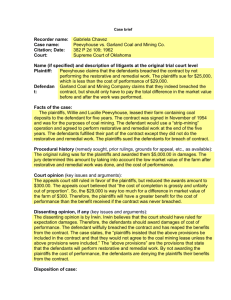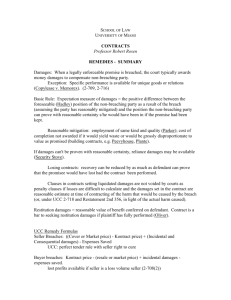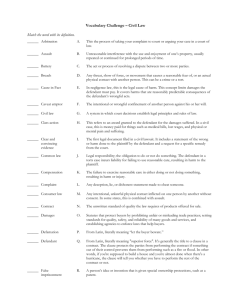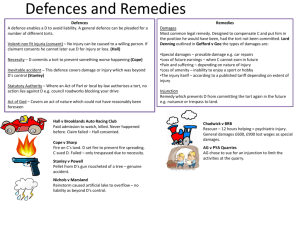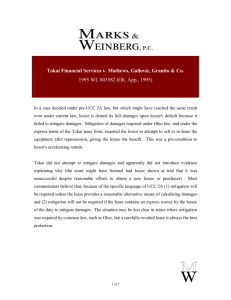Case summary brief (2
advertisement
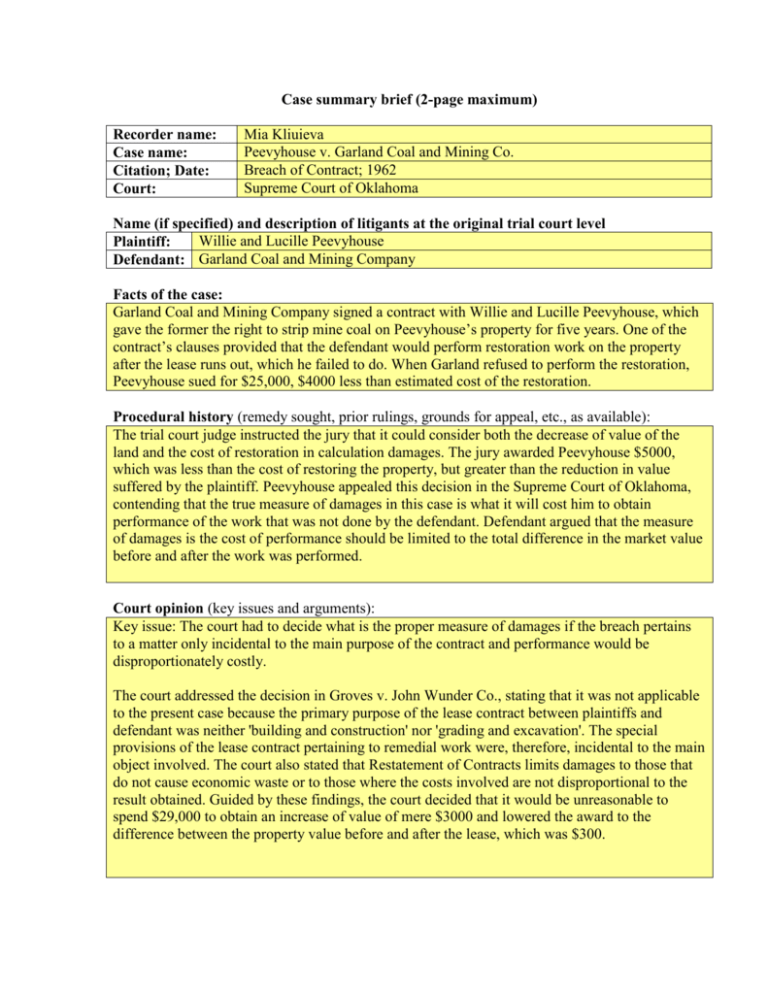
Case summary brief (2-page maximum) Recorder name: Case name: Citation; Date: Court: Mia Kliuieva Peevyhouse v. Garland Coal and Mining Co. Breach of Contract; 1962 Supreme Court of Oklahoma Name (if specified) and description of litigants at the original trial court level Willie and Lucille Peevyhouse Plaintiff: Defendant: Garland Coal and Mining Company Facts of the case: Garland Coal and Mining Company signed a contract with Willie and Lucille Peevyhouse, which gave the former the right to strip mine coal on Peevyhouse’s property for five years. One of the contract’s clauses provided that the defendant would perform restoration work on the property after the lease runs out, which he failed to do. When Garland refused to perform the restoration, Peevyhouse sued for $25,000, $4000 less than estimated cost of the restoration. Procedural history (remedy sought, prior rulings, grounds for appeal, etc., as available): The trial court judge instructed the jury that it could consider both the decrease of value of the land and the cost of restoration in calculation damages. The jury awarded Peevyhouse $5000, which was less than the cost of restoring the property, but greater than the reduction in value suffered by the plaintiff. Peevyhouse appealed this decision in the Supreme Court of Oklahoma, contending that the true measure of damages in this case is what it will cost him to obtain performance of the work that was not done by the defendant. Defendant argued that the measure of damages is the cost of performance should be limited to the total difference in the market value before and after the work was performed. Court opinion (key issues and arguments): Key issue: The court had to decide what is the proper measure of damages if the breach pertains to a matter only incidental to the main purpose of the contract and performance would be disproportionately costly. The court addressed the decision in Groves v. John Wunder Co., stating that it was not applicable to the present case because the primary purpose of the lease contract between plaintiffs and defendant was neither 'building and construction' nor 'grading and excavation'. The special provisions of the lease contract pertaining to remedial work were, therefore, incidental to the main object involved. The court also stated that Restatement of Contracts limits damages to those that do not cause economic waste or to those where the costs involved are not disproportional to the result obtained. Guided by these findings, the court decided that it would be unreasonable to spend $29,000 to obtain an increase of value of mere $3000 and lowered the award to the difference between the property value before and after the lease, which was $300. Dissenting opinion, if any (key issues and arguments): In the dissenting opinion, it was argued that the plaintiff was entitled to specific performance of the contract because the provision about the remedial work that the defendant refused to perform was an essential part of the agreement. In arguing its position, the dissent stated that the courts couldn’t make a better contract for the parties that they have made for themselves and, therefore, should not alter it for the benefit of one party and detriment of the other. Disposition of case: The award was reduced to $300 ANALYSIS OF THE CASE Liability for damages and types of damages 1. Course topic of the case: 2. How does the case relate to the course topic? It is an example of “reduction in value” damages. 3. Which previously assigned cases, if any, are related to this case, and how does this one differ? This case is related to Groves v. John Wunder Co. These cases are similar due to the fact that they involve contracts that include a provision for some remedial work that must be performed in the end of the term specified by the contract. In addition, in both cases there is a significant difference between the cost of performance and the market value of the performance. Unlike Peevyhouse, who received only $300 (the reduction of his property value), Groves was awarded the cost of performance damages of $60,000 (enough to complete the restoration). The difference between the two cases is in the nature of the restoration work: While in Peevyhouse the restoration work is only incidental to the main objective of the contract, in Groves it is an integral part of the contract. 4. How does the case affect economic incentives and efficiency? This case emphasized the importance of considering possible economic waste when awarding the damages. When the cost of performance is significantly higher than the increase in value that such performance would create and when the clause breached by one party relates to the main objective of the contract only incidentally, it might make more economic sense to consider only reduction in value when awarding the damages.

